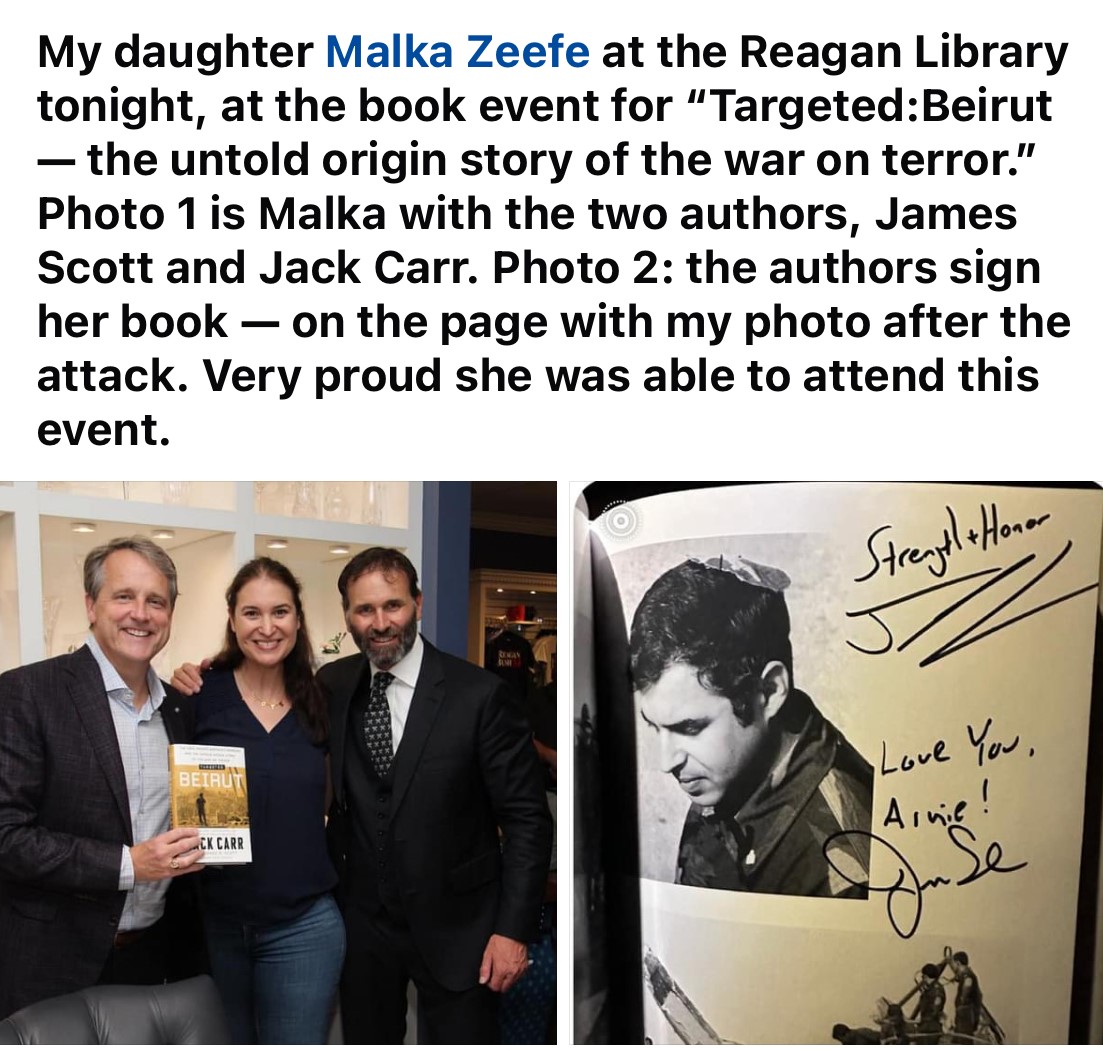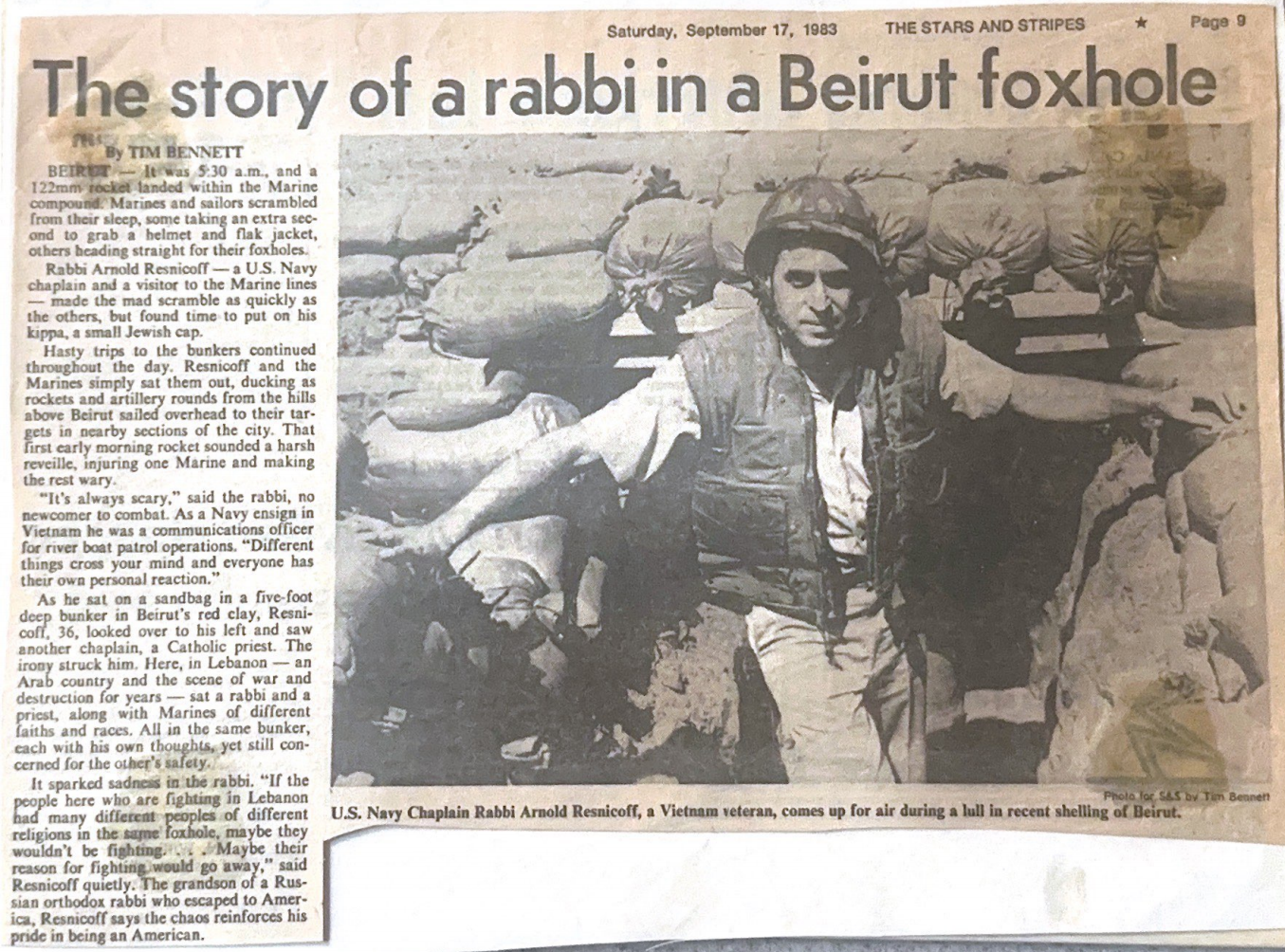
Background
Rabbi Resnicoff was present in Beirut, Lebanon, on October 23, 1983, at the time of the suicide truck bomb attack.
Then serving as one of the Sixth Fleet Chaplains, attached to the staff of Commander Sixth Fleet, onboard the flagship USS Puget Sound, in Gaeta, Italy, Rabbi Resnicoff was a frequent visitor to the Marines in Beirut.
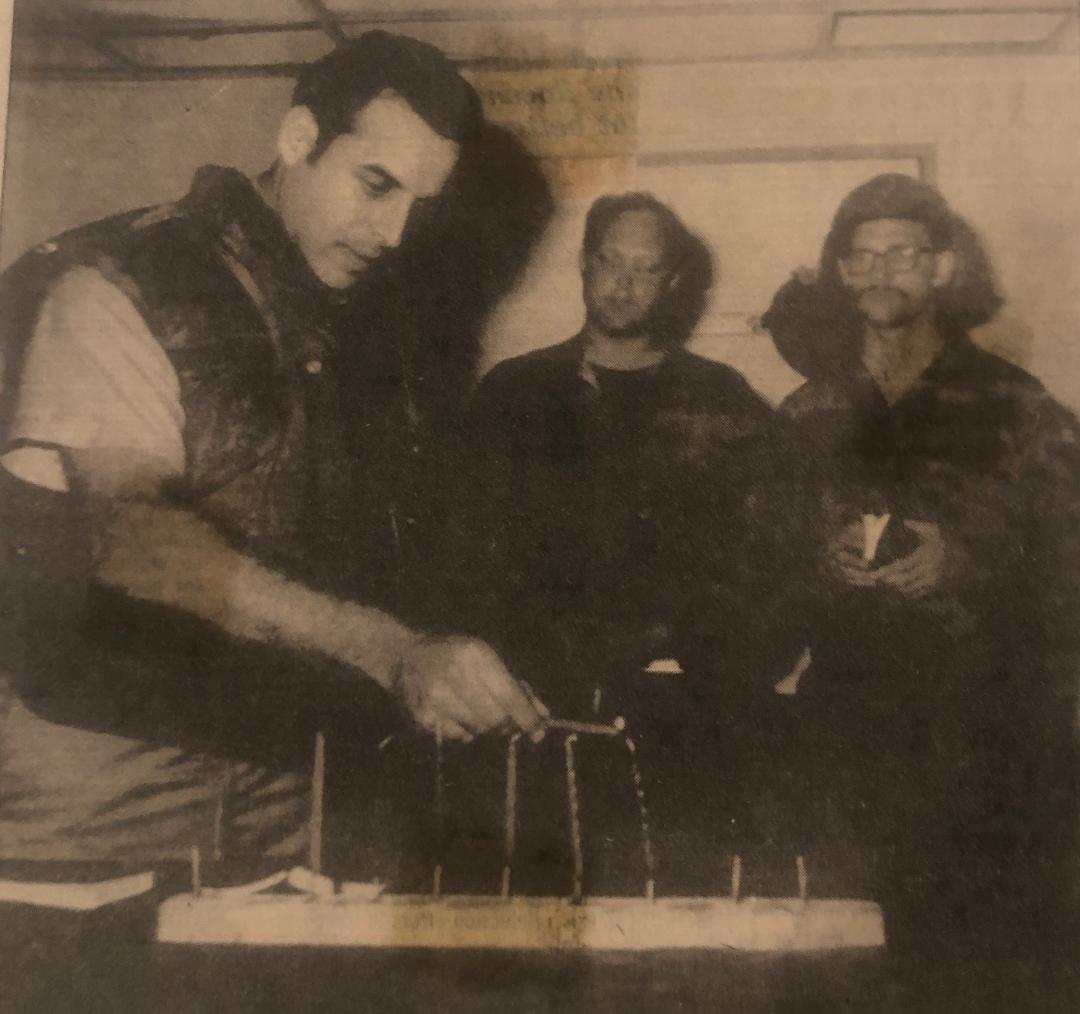
He flew to the Marine compound on Friday, October 21, 1983, to lead a memorial service for Allen Soifert, a young Marine from New Hampshire killed by sniper fire.

When the Marines offered to fly him back to Italy on Saturday, he explained that — unless life was in danger — he did not travel on the Jewish Sabbath (sunset Friday through sunset Saturday), and would therefore wait until Sunday. At 6:20 A.M. that Sunday, Oct 23, 1983, the suicide truck bomb attack occurred, ultimately taking the lives of 241 American military personnel.




Four days following the attack, then-Vice President George Bush led the White House team that visited the site. The Vice President requested that Rabbi Resnicoff write a report of the attack and the rescue effort, from his point of view as a Chaplain, and send it directly to the White House. Part of the visiting team, Edward V. Hickey, Jr., Assistant to President Reagan, sent a now-declassified cable to the White House Situation Room, to the attention of James A. Baker III (Chief of Staff), Michael K. Deaver (Deputy Chief of Staff), and Robert “Bud” McFarlane (Assistant to the President for National Security Affairs), reporting what he personally witnessed in the aftermath of the attack, including the service of Rabbi Resnicoff and his fellow chaplains.
President Reagan Keynote



In April 1984, when President Reagan delivered the keynote address to the Baptist Fundamentalism ’84 convention led by the Rev. Jerry Falwell, he told the attendees that he was going to do something that he had “never done before.” He was “going to read another man’s words” — the report from Beirut that he had received from Rabbi Arnold Resnicoff.
During the President’s remarks, a small group led a brief pre-planned demonstration, with chants and banners, “Bread Not Bombs.” The video clip is unedited, and includes this demonstration. It is a poignant reminder of President Reagan at the height of his strength, as he handles the hecklers with dignity and power, and reminds us all of his respect for the courage of our military personnel. “Wouldn’t it be nice,” he said, “if a little bit of that Marine spirit would rub off, and they would listen about brotherly love?”
The Story of the “Camouflage Kippa”


Here with the Marines in Beirut, providing Foxhole Counseling (1984)
Excerpt from Rabbi Resnicoff’s blog post:
We didn’t know how long it would take for medical help to arrive, but it seemed like an eternity. We did what we could, literally tearing our clothing apart to use pieces to wipe blood and dirt from the faces of wounded Marines. At one point, after tearing my t-shirt to shreds, I used the small black kippa that I regularly wore.
RESNICOFF, “The camouflage kippa: Memories of the1983 Beirut barracks bombing,” tHE BLOGS, The Times of israel (AUGUST 2023)
The “camouflage kippa” made with material Catholic chaplain Pucciarelli tore from the top of his uniform cap.
When we finally had a moment to catch our breath, “Pooch” (my friend, the Priest) tore off the top piece of his Marine camouflage cap, and brought it over to me, to wear. He told me that in that area of the world, where every religious group seemed to be gunning for every other group, he wanted our personnel to remember not only that we as chaplains helped everyone — regardless of religion, and regardless of whether any of the wounded claimed a religion — but also that we did it side-by-side, Christian and Jew. (Today there are chaplains representing other faiths, as well.) “Interfaith cooperation” was not some academic theory for us. It was — and continues to be — our mission, and our way of life.
For the two years before that 1983 bombing, congress had been debating a “religious apparel amendment” that would allow Jewish military personnel in uniform to wear “neat and conservative” head coverings, but it failed to pass. (The general rule back then was that Jewish chaplains could keep their heads covered, but not non-chaplains — and sometimes even chaplains were not allowed that right.) Senator Lautenberg and Congressman Solarz, the two men behind the amendment, had the story of the camouflage kippa read into the Congressional Record, and they later told me they thought that story was the tipping point for passage. Suddenly, the idea of a kippa in uniform was not just a question of uniformity, instead it became a symbol of unity: that despite all the religious and ethnic backgrounds of our military personnel, we were unified, working side by side, when the chips were down. That kippa became a symbol of how we were united in our fight for freedom, including religious freedom.
Rabbi Resnicoff’s story has been featured in events, articles, podcasts, books, and other interview formats. Rabbi Resnicoff also honors the memory of that day in speeches, prayers, and other writings around the anniversary date. As a “Rabbi ally,” in February 2024 Rabbi Resnicoff helped three Beirut LGBTQ veterans to establish the non-profit charitable organization GayVeterans.us.
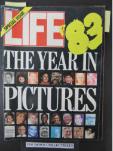
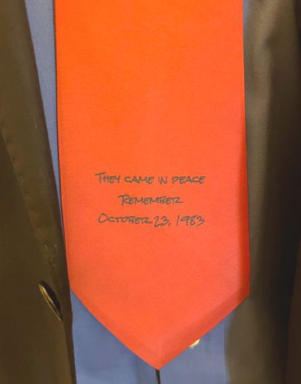
Media:
- Beirut Barracks Bombing: When US Marines Lost Their Lives to a Terror Attack (Soldier of Fortune Magazine, October 2024)
- Previously published as: Beirut Barracks Bombing: 40 Years Ago, US Marines Lost Their Lives to a Terror Attack; Today, Their Legacy Lives On (Soldier of Fortune Magazine, October 2023) (link no longer active)
- 40 years of terrorism, faith, and memory from Beirut to Gaza (The Deep Map, November 2023) (audio)
- The Camouflage Kippa: 40th Anniversary of the 1983 Beirut Barracks Bombing (National Museum of American Jewish Military History, October 2023) (video)
- The Priest, the Rabbi and the Beirut Terrorist Attack of 1983 (National Catholic Register, October 2023)
- Marine barracks bombing 4 decades ago still echoes in the Middle East (NPR, October 2023) (audio)
- Marine barracks bombing, which killed Hampton Roads Marines, still echoes in the Middle East (WHRO, October 2023)
- Pulled from the Pit in Beirut (The American Conservative, October 2023)
- The Camouflage Kippa: 40th Anniversary of the 1983 Beirut Barracks Bombing (Past Event, National Museum of American Jewish Military History, October 2023)
- Interfaith Foxholes (Jewish War Veterans, December 2021)
- ‘And the building was gone.’ Veterans remember Beirut bombing on 38th anniversary (Marine Corps Times, October 2021)
- Worn on This Day: The Clothes That Made History (Running Press, 2019) (book excerpt)
- 35 Years Ago October 23, 1983 Marine Barracks Beirut Bombed (Hugh’s News, October 2018)
- Emunah in the Face of Tragedy: A Chaplain’s Perspective (The Benjamin and Rose Berger CJF Torah To-Go Series, Rabbi Isaac Elchanan Theological Seminary, July 2018)
- Rabbi Arnold Resnicoff, retired Navy chaplain, found humanity amid war (National Catholic Reporter, November 2017)
- Today in history: The ‘camouflage kippa’ and the 1983 Beirut bombing (Religion News, October 2013)
- Religion- All in the Head or on the Head? (ajudaica blog, April 2013)
- Interview Recording (Veterans History Project, Library of Congress, 2010) (video)
- Beirut 1983: An Indelible Memory (Jewish Sightseeing, August 2005)
- The Fighting Rabbis: Jewish Military Chaplains and American History (NYU Press, 2001) (book excerpt)
- Rabbis Explain “Top to Top” [Chabad meeting with President Reagan] (Wellsprings, August-September 1986)
- Rabbis Among Warriors (Jewish Telegraphic Agency, December 1984)
- Rabbi’s camouflage yarmulke woven with tragedy, heroism (Norfolk Ledger-Star, January 1984)
- Kippah (Wikipedia)
- Chaplain (Kiddle)
New Book (and podcast):
On September 24, 2024, bestselling author and former Seal Jack Carr, together with Pulitzer finalist James M. Scott, published a new book focused on the Beirut Bombings, TARGETED: BEIRUT.
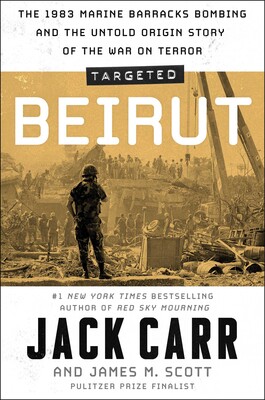
About the book, according to the publisher:
The first in a new in-depth nonfiction series examining the devastating terrorist attacks that changed the course of history from #1 New York Times bestselling author Jack Carr and Pulitzer Prize finalist James M. Scott, beginning with the 1983 Marine barracks bombing in Beirut.
1983: the United States Marine Corps experiences its greatest single-day loss of life since the Battle of Iwo Jima when a truck packed with explosives crashes into their headquarters and barracks in Beirut, Lebanon. This horrifying terrorist attack, which killed 241 servicemen, continues to influence US foreign policy and haunts the Marine Corps to this day.
Now, the full story is revealed as never before by Jack Carr and historian and Pulitzer Prize finalist James M. Scott. Based on comprehensive interviews with survivors, extensive military records, as well as personal letters, diaries, and photographs, this is the authoritative account of the deadly attack.
The authors interviewed Rabbi Resnicoff extensively about his experience, and his quotations, photos, and story are woven throughout. In advance of the book’s release, Jack Carr hosted Rabbi Resnicoff on his Danger Close podcast.
